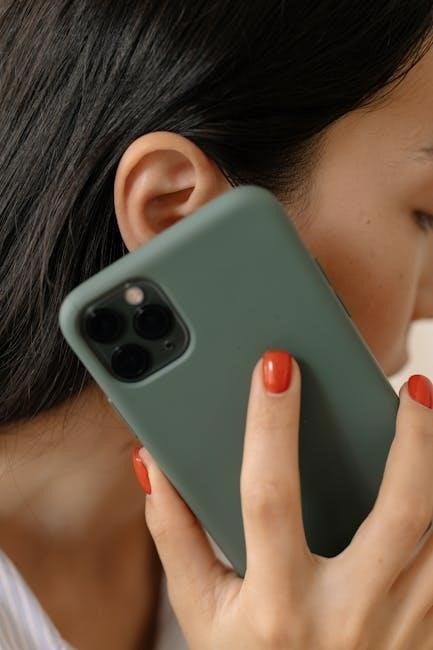Miss Manners’ Guide to Excruciatingly Correct Behavior, authored by Judith Martin, offers timeless advice on navigating social etiquette with grace and precision. First published in 1982, this guide remains a cornerstone for understanding proper conduct in various settings, from dining to workplace interactions. It emphasizes the importance of courtesy, respect, and consistency in behavior, providing practical tips for mastering etiquette in both formal and informal situations. Miss Manners’ wisdom continues to be relevant today, helping individuals foster positive relationships and avoid social faux pas in an ever-evolving world.
Overview of the Guide and Its Significance
Miss Manners’ Guide to Excruciatingly Correct Behavior, written by Judith Martin, is a comprehensive guide to navigating social etiquette with precision and grace. First published in 1982, the book has become a timeless resource for understanding proper conduct in various social, professional, and cultural contexts. It covers a wide range of topics, from dining etiquette and workplace manners to wedding protocol and modern communication. The guide is celebrated for its witty yet practical advice, offering readers the tools to master etiquette while maintaining authenticity. Its significance lies in its ability to balance tradition with contemporary life, making it a go-to resource for anyone seeking to refine their social skills and avoid awkward situations. The guide’s enduring popularity underscores the importance of courtesy and respect in fostering positive relationships.
Key Principles of Excruciatingly Correct Behavior
Miss Manners’ Guide to Excruciatingly Correct Behavior outlines core principles that emphasize respect, empathy, and consistency in social interactions. Central to the guide is the idea that good manners are universal, transcending specific situations or cultural contexts. Key principles include treating others with kindness, being mindful of social norms, and avoiding behaviors that may cause discomfort or offense. The guide also stresses the importance of authenticity and sincerity in interactions, discouraging insincere or overly formal behavior. By mastering these principles, individuals can navigate various social scenarios with confidence and grace, fostering positive relationships and avoiding awkwardness. The guide’s focus on timeless values ensures its relevance in both traditional and modern settings.

Dining Etiquette
Miss Manners’ guide emphasizes respect and consideration in dining settings, ensuring proper conduct and comfort for all. It applies to both formal and informal gatherings, promoting harmony at the table.
The Proper Way to Eat Spaghetti
According to Miss Manners, the proper way to eat spaghetti is to suck up, or slurp, the strands into the mouth. Use a fork to twirl the pasta, ensuring a manageable portion is lifted. Keep the mouth closed while slurping to avoid drawing attention. Avoid overloading the fork, as this can lead to messy spills. Neatness is key; ensure sauce is contained and napkins are nearby. Chewing with the mouth closed and refraining from loud noises demonstrates respect for others. Pace yourself, savoring each bite without rushing. This method balances practicality with politeness, aligning with Miss Manners’ principles of excruciatingly correct behavior.
Slurping Noodles: When It’s Acceptable
Miss Manners provides guidance on when slurping noodles is socially acceptable. In formal dining settings, slurping is generally frowned upon, as it may be perceived as impolite or distracting. However, in informal or casual meals, such as when enjoying pasta or Asian-style noodles, a moderate level of slurping can be tolerated if done discreetly. Cultural context matters; in some traditions, slurping is seen as a sign of enjoyment; Key is to balance enthusiasm with decorum: avoid excessive noise and ensure other diners are not disturbed. Using a fork or spoon to manage noodles gracefully is always a safe choice, especially in mixed company or formal events.
Table Manners for Formal and Informal Settings
Miss Manners emphasizes the importance of proper table etiquette in both formal and informal settings. In formal dining situations, maintaining good posture, keeping elbows off the table, and using utensils correctly are essential. Guests should wait for everyone to be served before eating and avoid speaking with their mouth full. In informal settings, while the rules are more relaxed, basic courtesy still applies, such as not double-dipping or making excessive noise while eating. Engaging in polite conversation and expressing gratitude for the meal are universal expectations. By adhering to these principles, individuals can create a respectful and enjoyable dining experience for themselves and others, regardless of the occasion.

Wedding Etiquette
Miss Manners’ guide outlines wedding etiquette, emphasizing respect and decorum. She classifies ceremonies as formal, semiformal, or casual, advising on attire, punctuality, and expressing gratitude appropriately.
Types of Wedding Ceremonies According to Miss Manners
Miss Manners categorizes wedding ceremonies into formal, semiformal, and informal. Formal weddings are elaborate, with many guests, while semiformal strikes a balance between elegance and simplicity. Informal ceremonies are intimate and straightforward. She emphasizes respecting traditions and tailoring the event to reflect the couple’s style and values, ensuring decorum and thoughtfulness in all aspects.
Appropriate Behavior for Guests
Miss Manners emphasizes that guests should always exhibit respect, gratitude, and consideration. Arriving on time and dressing appropriately according to the occasion are essential. Guests should refrain from inappropriate behavior such as interrupting, criticizing, or dominating conversations. Expressing genuine thanks to the host is crucial, both verbally and through thank-you notes afterward. Miss Manners also advises guests to respect the host’s rules, including dietary preferences and seating arrangements; By adhering to these guidelines, guests ensure a pleasant and harmonious experience for everyone involved.
Wedding Invitations: Dos and Don’ts
Miss Manners outlines clear guidelines for crafting and sending wedding invitations. DO ensure clarity and formality, including the host’s name, date, time, location, and RSVP details. Use proper titles and honorifics to show respect for guests. Send invitations well in advance, typically 6–8 weeks before the ceremony. DO NOT use informal language or slang, nor include registry information. Refrain from sending digital invites for formal weddings. DO address envelopes correctly, avoiding labels. DO NOT pressure guests to attend or bring gifts. Include a deadline for RSVPs to help with planning. Remember to send thank-you notes after the event. These rules ensure elegance and consideration for all involved.

Workplace Etiquette
Miss Manners stresses the importance of punctuality, proper dress, and respectful communication in the workplace. Minimize interruptions and avoid overly casual behavior to maintain professionalism and courtesy among colleagues.
Etiquette for Job Interviews
Miss Manners emphasizes the importance of punctuality, appropriate attire, and respectful demeanor during job interviews. Arrive prepared with copies of your resume and research on the company. Dress conservatively to reflect professionalism. Turn off electronic devices and avoid casual language. Address interviewers formally until invited to use first names. Show genuine interest in the role and ask thoughtful questions. Express gratitude at the end of the interview and follow up with a polite thank-you note. These courtesies demonstrate respect and leave a positive impression, aligning with Miss Manners’ principles of excruciatingly correct behavior.
Behavior in the Workplace
Miss Manners advocates for a workplace culture rooted in respect and professionalism. Arrive on time and maintain a tidy workspace. Avoid gossip or overly casual communication, which can undermine professionalism. Address colleagues politely, using appropriate titles unless invited to use first names. Be mindful of noise levels and avoid interrupting others. Show appreciation for colleagues’ efforts and acknowledge contributions graciously. Miss Manners also emphasizes the importance of meeting deadlines and fulfilling commitments reliably. By fostering a respectful and considerate environment, employees can create a positive workplace atmosphere that aligns with the principles of excruciatingly correct behavior.
Office Communication: Written and Verbal
Miss Manners stresses the importance of clear, concise, and respectful communication in the workplace. Written communication, such as emails, should be professional and free of slang or informal language. Always proofread for clarity and grammar. Verbal communication demands active listening and avoiding interruptions. Maintain a respectful tone, even in disagreements. Avoid raising your voice or using overly casual phrases. Miss Manners also advises against using jargon or overly complex language that may confuse others. Be mindful of nonverbal cues, such as maintaining appropriate eye contact and avoiding distracting gestures. By adhering to these guidelines, workplace interactions become more effective and courteous, fostering a positive environment.
Communication Skills
Miss Manners emphasizes the importance of clarity, respect, and active listening in communication. Engage thoughtfully, express ideas concisely, and adapt your tone to your audience for effective interactions.
The Art of Polite Conversation
Miss Manners stresses the importance of engaging in conversations with grace and consideration. Active listening, clarity, and respect are key to fostering meaningful dialogue. Avoid interrupting others and refrain from dominating discussions. Instead, encourage others to share their thoughts by asking open-ended questions. Express ideas clearly and avoid filler words or overly casual language. Non-verbal cues, such as maintaining eye contact and using appropriate gestures, also play a crucial role. Miss Manners advises balancing wit with tact, ensuring conversations remain enjoyable and inclusive. Mastering polite conversation requires patience, empathy, and a genuine interest in others.
Handling Difficult Conversations
Miss Manners provides guidance on navigating challenging discussions with tact and poise. Stay calm and composed, even when faced with disagreement or hostility. Use respectful language and avoid personal attacks or inflammatory remarks. Listen actively to the other party’s perspective, acknowledging their feelings without necessarily agreeing. Focus on the issue rather than making it personal, and seek common ground when possible. Be honest yet kind, ensuring your words are constructive rather than hurtful. Miss Manners also advises setting boundaries firmly but politely, if the conversation becomes unproductive or disrespectful. Mastering this skill fosters understanding and preserves relationships, even in challenging situations.
Written Communication: Letters and Emails
Miss Manners stresses the importance of clarity, respect, and precision in written communication. Letters and emails should always begin with a proper salutation and closing, such as “Dear [Name]” and “Sincerely.” Avoid slang or overly casual language, as it may diminish the gravity of your message. Be concise yet thorough, ensuring your intent is clear. Proofread for grammar and spelling errors, as mistakes can undermine your credibility. Use proper titles (e.g., Mr., Ms., Dr.) unless the recipient has indicated a preference for informality. Maintain a respectful tone, even in disagreements, to preserve dignity and foster understanding. Miss Manners advises that well-crafted written communication reflects both intelligence and courtesy, making it a timeless art worth mastering.

Modern Etiquette
Miss Manners’ guide emphasizes adapting traditional etiquette to contemporary life, addressing modern dilemmas like digital interactions, social media manners, and balancing technology with timeless values of respect and kindness.
Etiquette in the Digital Age
Miss Manners’ guide highlights the importance of adapting traditional etiquette to modern digital interactions. She emphasizes respectful communication in emails, texts, and social media, urging clarity and kindness. Proper online manners include avoiding oversharing, refraining from digital arguments, and maintaining privacy. Miss Manners also advises against using technology during formal events or conversations, promoting balance between connectivity and genuine human interaction. Her wisdom helps navigate the complexities of the digital world while preserving timeless values of respect and consideration in all forms of communication. Her insights remain invaluable for fostering positive relationships in today’s tech-driven society.
Modern Manners for Social Media
Miss Manners’ guide extends to modern social media etiquette, emphasizing the need for civility online. She advises against oversharing and encourages users to be mindful of their audience. Posting controversial opinions should be approached with caution, as they can spark unnecessary conflicts. Responding to comments should always be done politely, even when disagreeing. Miss Manners also stresses the importance of respecting privacy by avoiding the sharing of personal news without consent. Additionally, she cautions against engaging in online arguments, as they rarely resolve disputes. By following these guidelines, individuals can maintain a positive and respectful digital presence, aligning with Miss Manners’ timeless principles of courtesy and consideration.
Adapting Traditional Etiquette to Contemporary Life
Miss Manners’ guide highlights the importance of adapting traditional etiquette to modern life while preserving its core values. She emphasizes that good manners are timeless and should evolve to fit contemporary contexts. For instance, traditional table manners can be applied to casual dining settings, while respectful communication remains essential in digital interactions. Miss Manners advises being mindful of technological advancements, such as avoiding phone use during meals or conversations. She also stresses the value of kindness and consideration in all interactions, whether in person or online. By blending timeless principles with modern practices, individuals can navigate today’s world with grace and tact, ensuring etiquette remains relevant and meaningful in changing times.
Miss Manners’ guide emphasizes timeless principles of respect and tact, offering practical wisdom for navigating modern life with grace and poise. Etiquette remains essential in fostering meaningful connections and a harmonious society.
Why Etiquette Matters in Today’s World
Etiquette serves as a cornerstone of respect, fostering harmony and understanding in all interactions. In a fast-paced, diverse world, it provides a framework for clear communication and mutual respect. Miss Manners’ guide highlights how timeless principles like kindness, empathy, and consistency in behavior are essential for building trust and strong relationships. Etiquette not only enhances personal and professional interactions but also promotes inclusivity and social cohesion. By adhering to these principles, individuals can navigate modern challenges with confidence and grace, ensuring their actions reflect respect for others. Etiquette remains a vital tool for thriving in today’s complex and interconnected society.
Practical Tips for Mastering Excruciatingly Correct Behavior
Mastering excruciatingly correct behavior begins with consistency and self-awareness. Miss Manners’ guide suggests practicing good manners in every interaction, no matter how small. Start by being mindful of nonverbal cues, such as posture and eye contact, which convey respect. Listen actively and respond thoughtfully, showing genuine interest in others. Empathy and kindness are key; consider how your actions may impact those around you. Additionally, master both verbal and nonverbal communication, ensuring clarity and tact. Finally, stay informed about cultural norms to navigate diverse social situations with grace. By integrating these tips, you can embody timeless etiquette in everyday life.




About the author